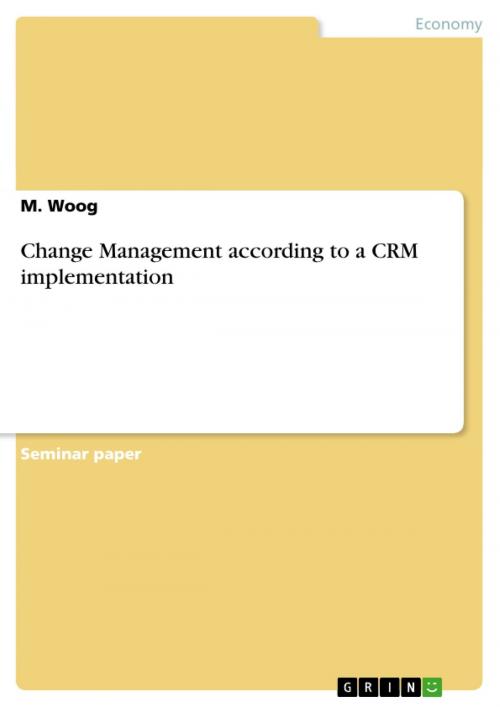| Author: | M. Woog | ISBN: | 9783640280650 |
| Publisher: | GRIN Publishing | Publication: | March 5, 2009 |
| Imprint: | GRIN Publishing | Language: | English |
| Author: | M. Woog |
| ISBN: | 9783640280650 |
| Publisher: | GRIN Publishing |
| Publication: | March 5, 2009 |
| Imprint: | GRIN Publishing |
| Language: | English |
Seminar paper from the year 2008 in the subject Business economics - Marketing, Corporate Communication, CRM, Market Research, Social Media, grade: 1,7, University of Applied Sciences Mainz, course: Change Management, 62 entries in the bibliography, language: English, abstract: Changing customer needs, replacement of the leading Management, new employees or the implementation of new information technology - there are many reasons why organisations change. Change is nowadays a central element of every organisation. Some are driven by the change, others drive the change and are managing it active and foresighted. The surrounding of companies changed and they are on the brink of new challenges with an integrated orientation on profitable customer relations and therefor a successful Customer Relationship Management (CRM) is basically and is a central competitive advantage (Rapp, 2000, p. 35). The implementation of new IT-systems focusing the CRM aspect is important to understand the customer needs and handle the customers adequare to their relation to the organisation. The assimilation of the organisation to the changed market- and environmental terms are leading to deep changes. Changing structures, a new organisation of company divisions, introduction of new managment systems, adjustment of the companys strategy are mostly driven or intensified by the globalisation and are first and foremost concerning the industrial nations (Vahs, 2007, p.281). So changes concern the company, executives and employees, for all these affected participants a change means to learn new working techniques, the handling of new IT or the coorperation with new colleagues. Employees often react to this kind of changes with ressistance. Change Management (CM) operates these change processes and reacts to the ressistance of the affected people. Further more it handles the implementation of CRM, which failed numerous in the past. The reasons are mainly the neglect of the affected people, their positions inside the companys and the still prevailing opinion about CRM as a pure IT-system (Pattloch 2001, p.26).
Seminar paper from the year 2008 in the subject Business economics - Marketing, Corporate Communication, CRM, Market Research, Social Media, grade: 1,7, University of Applied Sciences Mainz, course: Change Management, 62 entries in the bibliography, language: English, abstract: Changing customer needs, replacement of the leading Management, new employees or the implementation of new information technology - there are many reasons why organisations change. Change is nowadays a central element of every organisation. Some are driven by the change, others drive the change and are managing it active and foresighted. The surrounding of companies changed and they are on the brink of new challenges with an integrated orientation on profitable customer relations and therefor a successful Customer Relationship Management (CRM) is basically and is a central competitive advantage (Rapp, 2000, p. 35). The implementation of new IT-systems focusing the CRM aspect is important to understand the customer needs and handle the customers adequare to their relation to the organisation. The assimilation of the organisation to the changed market- and environmental terms are leading to deep changes. Changing structures, a new organisation of company divisions, introduction of new managment systems, adjustment of the companys strategy are mostly driven or intensified by the globalisation and are first and foremost concerning the industrial nations (Vahs, 2007, p.281). So changes concern the company, executives and employees, for all these affected participants a change means to learn new working techniques, the handling of new IT or the coorperation with new colleagues. Employees often react to this kind of changes with ressistance. Change Management (CM) operates these change processes and reacts to the ressistance of the affected people. Further more it handles the implementation of CRM, which failed numerous in the past. The reasons are mainly the neglect of the affected people, their positions inside the companys and the still prevailing opinion about CRM as a pure IT-system (Pattloch 2001, p.26).















